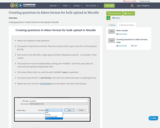
Creating questions in Aiken format for bulk upload in Moodle
- Subject:
- Information Science
- Material Type:
- Reading
- Author:
- sushumna Rao
- Date Added:
- 07/09/2021


Creating questions in Aiken format for bulk upload in Moodle
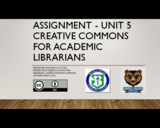
Creative Commons For Academic Librarians
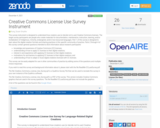
This survey instrument is designed to understand how creators use (or decide not to use) Creative Commons licenses. The target survey participants are people who create materials for documentation, maintenance, instruction, learning, and/or revitalization of Indigenous, minority, endangered, and/or low-resourced languages. Part 1 of this survey is designed to learn about the digital creation formats and sharing practices in this specific community of practice. Parts 2 through 4 of this survey contain general questions intended to elicit information about research participants’ knowledge and awareness of Creative Commons (CC) licenses; understanding of how to apply CC licenses to their digital creations; interest in and experience with applying CC licenses to their digital creations; motivations for and barriers to applying CC licenses to their digital creations; and understanding of how to adapt or reuse digital creations licensed with CC licenses.
This survey can be easily adapted for use in other communities of practice by editing some of the questions and multiple-choice responses.
If you wish to read this survey and background information about it, please start with the file ReadMe-CCLuseSurvey.pdf.
The file Creative_Commons_License_Use_Survey.qsf is a Qualtrics Survey File that can be used to recreate this survey in your own instance of the Qualtrics software.
The file Creative_Commons_License_Use_Survey.pdf is a PDF of the survey. This version includes Creative Commons graphics that are used in the survey questions. The file ReadMe-CCLuseSurvey.pdf does not include the graphics.
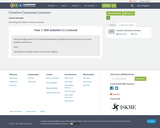
Describing the Creative Commons Licenses.

This infographic introduces the main aspects of Creative Commons licenses. An accessible infographic transcript is available at this url: https://docs.google.com/document/d/1mHMBXlnnMKMxEcTpNv9QZ97rqf_Lt7i9H4ipg--fmC0/edit?usp=sharing
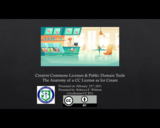
Creative Commons Licenses & Public Domain Tools -- The Anatomy of a CC License as Ice Cream
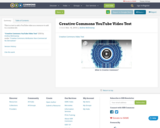
This is a test to add a YouTube video as a resource to add to a curation list.
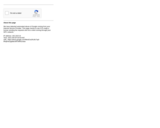
This open access book is tailored to educators and librarians to teach them more about how to use and apply creative commons licenses. The book covers the basics of copyright law and licensing, as well as how to choose, find, and use creative commons licensed materials. There is an entire section of the book specifically dedicated to creative commons for educators and librarians, including chapters on open access to scholarship, open pedagogy, open educational resources, and more.
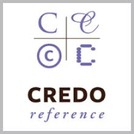
Overview on how to use Credo Reference, provided by Shelton State Community College for use by enrolled students.All videos are closed captioned.

Word Count: 43314
(Note: This resource's metadata has been created automatically by reformatting and/or combining the information that the author initially provided as part of a bulk import process.)
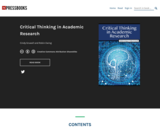
Word Count: 43386
(Note: This resource's metadata has been created automatically by reformatting and/or combining the information that the author initially provided as part of a bulk import process.)

Word Count: 44043
(Note: This resource's metadata has been created automatically by reformatting and/or combining the information that the author initially provided as part of a bulk import process.)

A reading guide
Word Count: 8403
(Note: This resource's metadata has been created automatically by reformatting and/or combining the information that the author initially provided as part of a bulk import process.)

A perfect introduction to the exploding field of Data Science for the curious, first-time student. The author brings his trademark conversational tone to the important pillars of the discipline: exploratory data analysis, choices for structuring data, causality, machine learning principles, and introductory Python programming using open-source Jupyter Notebooks. This engaging read will allow any dedicated learner to build the skills necessary to contribute to the Data Science revolution, regardless of background.
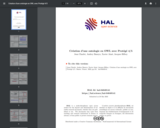
Création d’une ontologie en OWL avec Protégé
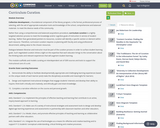
Collection development, a foundational component of the library program, is the formal, professional process of selecting, with the aid of appropriate evaluation tools and knowledge of the school, comprehensive and balanced materials to meet the diverse needs of the community.Rather than using a comprehensive and balanced acquisitions procedure, curriculum curation is a tightly targeted selection process to meet the knowledge and/or cognitive goals of instruction in service of student learning. Rather than generalized pointers to resources, curation will identify a specific section or element within each resource. Therefore, curriculum curation requires co-planning with faculty and using professional discernment, adding value to the chosen resources. Dialogue between librarian and instructor must be part of the curation process In order to surface student learning goals. Such negotiated curation shines a light on the expertise that each educator brings to the conversation about the thinking tasks and relevant experiences that will augment student learning. This module scaffolds and models curating an interdependent set of OER sources and tools to support the instructional core of a unit.Granite State Learning Outcomes3. Demonstrate the ability to facilitate developmentally appropriate and challenging learning experiences based on the unique needs of each learner (and) make the discipline(s) accessible and meaningful for learners;6. Design and implement instructional strategies that engage students’ interests and develop their ability to: inquire; think both critically and creatively; and ethically gain and share knowledge;15. Complete a narrative reflection on the course and personal growth.AASL CompetenciesAASL Standard 1.2 a: Implement the principles of effective teaching and learning that contribute to an active, inquiry-based approach to learning.AASL Standard 1.2 b: Make use of a variety of instructional strategies and assessment tools to design and develop digital-age learning experiences and assessments in partnership with classroom teachers and other educators.AASL Standard 1.3 a: Model, share, and promote effective principles of teaching and learning as collaborative partners with other educators.AASL Standard 1.4 c: Integrate the use of technologies as a means for effective and creative teaching and to support P-12 students' conceptual understanding, critical thinking and creative processes.PSEL Standard 4 a: Implement coherent systems of curriculum, instruction, and assessment that promote the mission, vision, and core values of the school, embody high expectations for student learning, align with academic standards, and are culturally responsive.PSEL Standard 4 e: Promote the effective use of technology in the service of teaching and learning.

Autumn 2022 Edition
Short Description:
This textbook is based on materials sourced from different practitioners from the world of research design, data collection, analysis, and interpretation. The author and her collaborators have also added materials to supplement the available literature. This activity is aligned with SDG4 – Quality Education and SDG10 - Reduced Inequalities. NewParaThis first edition is running concurrently with Customer Insights. Second Edition.
Long Description:
Increasingly, the concept of marketing research is being replaced with the term ‘customer or consumer insights’. As decision-makers are bombarded with data, it is important to have an Insights Team or Department which can sift through it all and identify those nuggets of information that can meaningfully explain human behaviour. Such insights must translate into an informed business strategy for success. This book has been curated to ensure that the practice of data collection, analysis, and interpretation is presented from an industry perspective. This first edition is running concurrently with Customer Insights. Second Edition https://oercollective.caul.edu.au/customer-insights/
Word Count: 41271
(Note: This resource's metadata has been created automatically by reformatting and/or combining the information that the author initially provided as part of a bulk import process.)
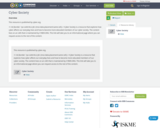
This resource is published by cyber.org.Cyber Society is a resource that explores how cyber affects our everyday lives and how to become more educated members of our cyber society. The content lives on an LMS that is maintained by CYBER.ORG. This link will take you to an informational page where you can request access to the rest of the content.

Este recurso educativo tiene la finalidad de ayudar al desarrollo de habilidades científicas de los estudiantes, fomentando los saberes heurísticos, relacionados con el acceso, evaluación, recuperación y uso de información de diversas fuentes, esta infografía es un tutorial de cono hacer una búsqueda bibliográfica en PubMed. Ha sido elaborada por los profesores: Dra. Aracely López Monteon, Dr. Angel Ramos Ligonio, Dra. Esmeralda Sánchez Pavón y Dr. Jesús Torres Montero, todos profesores de la Facultad de Ciencias Químicas de la Universidad Veracruzana, Orizaba, Veracruz, México
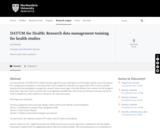
Abstract
Training materials. The DATUM for Health training programme covers both generic and discipline-specific issues, focusing on the management of qualitative, unstructured data, and is suitable for students at any stage of their PhD. It aims to provide students with the knowledge to manage their research data at every stage in the data lifecycle, from creation to final storage or destruction. They learn how to use their data more effectively and efficiently, how to store and destroy it securely, and how to make it available to a wider audience to increase its use, value and impact.